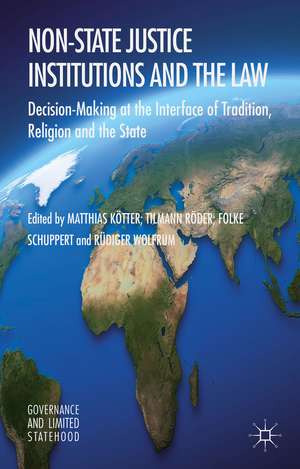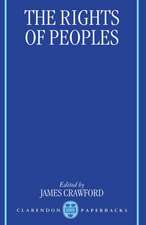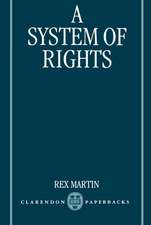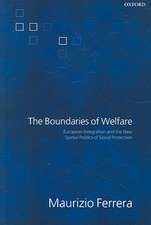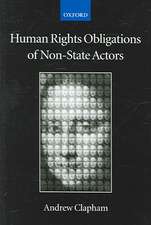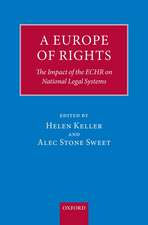Non-State Justice Institutions and the Law: Decision-Making at the Interface of Tradition, Religion and the State: Governance and Limited Statehood
Editat de M. Kötter, T. Röder, F. Schuppert, R. Wolfrumen Limba Engleză Hardback – 2 feb 2015
Din seria Governance and Limited Statehood
-
 Preț: 394.51 lei
Preț: 394.51 lei - 15%
 Preț: 644.95 lei
Preț: 644.95 lei -
 Preț: 397.38 lei
Preț: 397.38 lei -
 Preț: 389.31 lei
Preț: 389.31 lei -
 Preț: 389.11 lei
Preț: 389.11 lei -
 Preț: 388.72 lei
Preț: 388.72 lei - 15%
 Preț: 644.18 lei
Preț: 644.18 lei -
 Preț: 390.63 lei
Preț: 390.63 lei -
 Preț: 391.61 lei
Preț: 391.61 lei -
 Preț: 386.39 lei
Preț: 386.39 lei -
 Preț: 392.97 lei
Preț: 392.97 lei -
 Preț: 392.21 lei
Preț: 392.21 lei - 18%
 Preț: 781.62 lei
Preț: 781.62 lei - 18%
 Preț: 723.51 lei
Preț: 723.51 lei - 18%
 Preț: 723.21 lei
Preț: 723.21 lei -
 Preț: 226.45 lei
Preț: 226.45 lei - 15%
 Preț: 639.08 lei
Preț: 639.08 lei - 18%
 Preț: 727.66 lei
Preț: 727.66 lei
Preț: 389.88 lei
Nou
Puncte Express: 585
Preț estimativ în valută:
74.60€ • 78.10$ • 61.73£
74.60€ • 78.10$ • 61.73£
Carte tipărită la comandă
Livrare economică 07-21 aprilie
Preluare comenzi: 021 569.72.76
Specificații
ISBN-13: 9781137403278
ISBN-10: 1137403276
Pagini: 252
Ilustrații: XIII, 252 p.
Dimensiuni: 140 x 216 x 16 mm
Greutate: 0.46 kg
Ediția:2015
Editura: Palgrave Macmillan UK
Colecția Palgrave Macmillan
Seria Governance and Limited Statehood
Locul publicării:London, United Kingdom
ISBN-10: 1137403276
Pagini: 252
Ilustrații: XIII, 252 p.
Dimensiuni: 140 x 216 x 16 mm
Greutate: 0.46 kg
Ediția:2015
Editura: Palgrave Macmillan UK
Colecția Palgrave Macmillan
Seria Governance and Limited Statehood
Locul publicării:London, United Kingdom
Cuprins
Introduction: A Bifurcated Theory of Law in Hybrid Societies: The Rule of Law and Non-state Justice; Brian Z. Tamanaha 1.1. The Recent Turn to Non-state Justice Institutions 1.2. How Hybrid Legal Situations Came About 1.3. A Bifurcated Law and Society 1.4. The Apparent Misfit with the Rule of Law 1.5. Conclusion PART I: RECOGNIZING NON-STATE JUSTICE INSTITUTIONS: FIVE CASES 1. Pakistan: Jirgas Dispensing Justice without State Control; Tilmann J. Röder and Naveed A. ShinwarI 1.1. Introduction 1.2. Governance and Dispute Settlement in FATA 1.3. Legality and Legitimacy of Decision-Making in the Existing Framework 1.4. Conclusions 2. South Sudan: Linking the Chiefs' Judicial Authority and the Statutory Court System; Katharina Diehl, Ruben Madol Arol and Simone Malz 2.1. Introduction: Traditional Authorities and Customary Law in South Sudan 2.2. Contemporary Legal Framework of the Judicial System 2.3. Decision-Making in the Customary Court System 2.4. Interaction of Statutory Courts and Customary Courts – Two Parallel Systems or Two Branches of the Same Legal Structure? 2.5. Conclusion: The Political Relevance of Chief Courts in the Post-Conflict Situa-tion of South Sudan 3. Ethiopia: Legal and Judicial Plurality and the Incorporation of Traditional Dispute Resolution Mechanisms within the State Justice System (Girmachew Alemu Aneme) 3.1. Introduction 3.2. The State Justice System 3.3. The Incorporation of the Traditional Dispute Resolution Process of Shimglina within the State Justice System 3.4. The Non-State Justice Systems 3.5. Conclusions 4. Bolivia: Normative Equality between State and Customary Law. Utopia or the Future of Hybrid Normative Systems?; Lorena Ossio Bustillos 4.1. General Introduction to the Country and the Justice System 4.2. Authority System in Traditional Justice (Customary Law) 4.3. Constitutionalization and Legislation of Indigenous Law 4.4. The Mandatory Nature of the Indigenous Legal System 4.5. Conclusion 5. South Africa: Legal Recognitionof Traditional Courts ? Legal Pluralism in Action; Christa Rautenbach 5.1. Introduction 5.2. Historical Context 5.3. Contemporary Legal Framework 5.4. Concluding Remarks PART II: NON-STATE JUSTICE INSTITUTIONS AND THE LAW: CONCEPTUAL APPROACHES 1. Non-state Justice Institutions: A Matter of Fact and a Matter of Legislation (Matthias Kötter) 1.1. Non-State Justice Institutions and the Rule of Law 1.2. Various Degrees of Statehood and Non-State Justice Institutions 1.3. Incorporating Non-State Justice Institutions into the State Law System 1.4. Design of Regulations 1.5. Conclusion 2. From Normative Pluralism to a Pluralism of Norm Enforcement Regimes:A Governance Research Perspective; Gunnar Folke Schuppert 2.1. From 'Legal Pluralism' to 'Judicial Pluralism' 2.2. On the Enforcement Dimension of Every Normative Order 2.3. A Survey of the Diverse Regimes of Norm Enforcement: From Government Mandated Law Enforcement to Compliance Management within a Firm 2.4. A Few Critical Concluding Remarks 3. Legal Pluralism from the Perspective of International Law; Rüdiger Wolfrum 3.1. Introduction 3.2. Legal Pluralism and International Law in General 3.3. Objectives Pursued through Legal Pluralism in Selected National Legal Systems 3.4. Conclusion
Notă biografică
Katharina Diehl, Max Planck Foundation for International Peace and the Rule of Law, Germany.Girmachew Alemu Aneme, University of Addis Ababa, Ethiopia.Justice Ruben Madol Arol, Supreme Court of South Sudan, Juba, South SudanSimone Malz, Max Planck Institute for Comparative Public Law and International Law, Germany.Lorena Ossio Bustillos, Max Planck Institute for Social Law and Social Policy, Germany.Christa Rautenbach, North-West University, South Africa.Naveed Ahmad Shinwari, Community Appraisal and Motivation Programme (CAMP), Pakistan.Brian Z. Tamanaha, Washington University, Illinois, USA.
